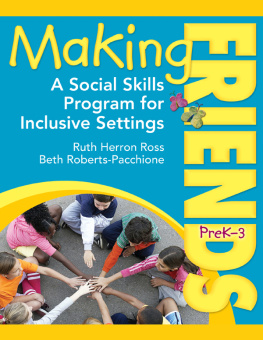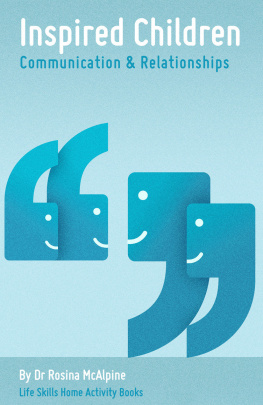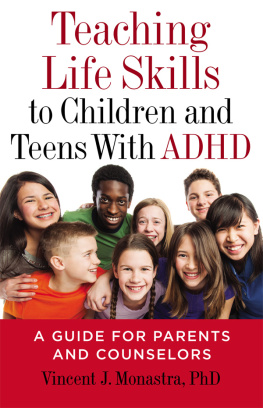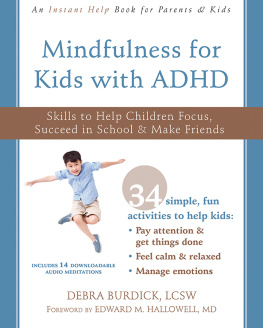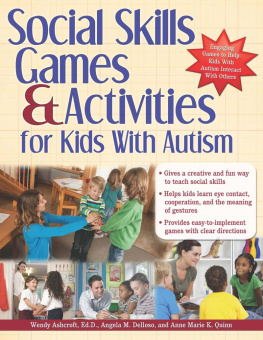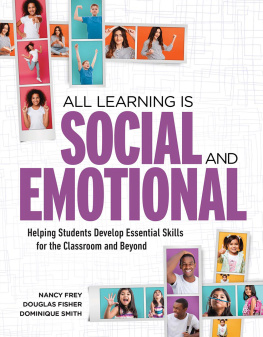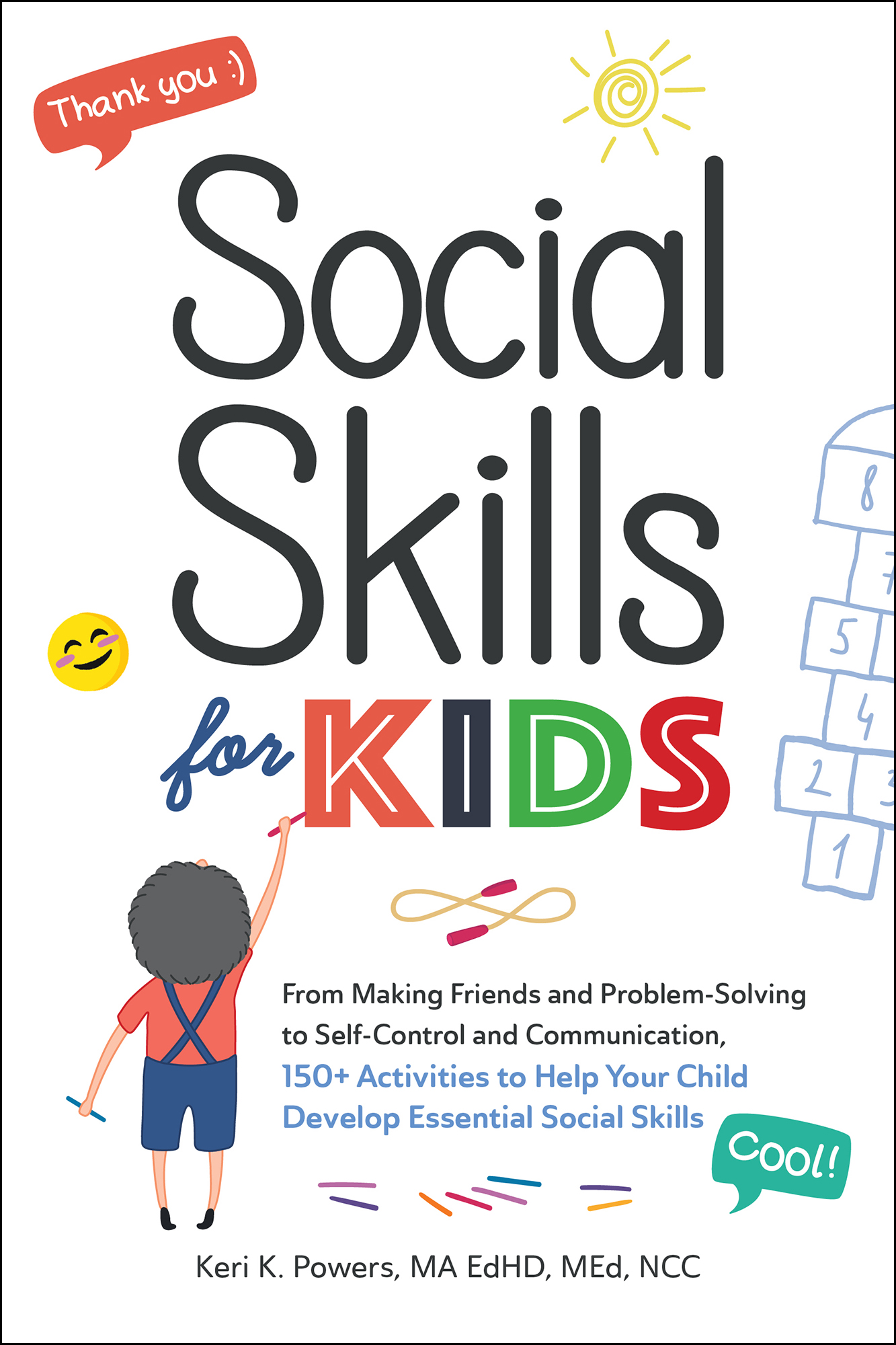Contents
Guide
Thank you :)
Social Skills for Kids
From Making Friends and Problem-Solving to Self-Control and Communication, 150+ Activities to Help Your Child Develop Essential Social Skills
Cool!
Keri K. Powers, MA EdHD, MEd, NCC
PRAISE FOR SOCIAL SKILLS FOR KIDS
This book is a treasure trove of interactive social skills activities that every parent or educator should have on their shelf. Keri has made it really easy to understand how to find those teachable moments and start supporting students immediately.
Brandy Thompson , author of Learn, Grow, Succeed!: A Kids Growth Mindset Journal
Spending special time together and learning how to empathize are among the greatest gifts we can give our children. Social Skills for Kids helps accomplish both through practical, fun activities. I highly recommend the I Hear You! Empathy Skills to any fellow caregiver of young kids!
Tana Amodeo , certified positive discipline parent educator and founder of SuchaLittleWhile.com
As an LCSW working in a school system, this book is a dream! Its so well organized and easy to use. I love all the extras added in explaining social skills at different ages. Having a book of this quality that I can just grab and go with is something I treasure!
Rachel R. Duke , licensed clinical social worker
INTRODUCTION
Weekly playgroupsone-on-one playdatestalking to people of various agesvirtual communication: Young children are exposed to a wide variety of social situations both in school settings and at home, but they dont always have the experience or knowledge to understand how to handle them. Learning key social skills, like making eye contact, speaking at an appropriate volume, sensing and respecting others feelings, listening carefully, and exhibiting self-control, can help them feel prepared and approach these situations with excitement and interest instead of fear and stress.
Teaching your young child social skills early onat roughly ages 18offers a wide range of important benefits. Many studies show that strong social skills help kids reduce stress levels, play and work cooperatively with peers, achieve greater academic success, and develop deeper relationships with those around them.
Just as you begin teaching your child how to count, recite the alphabet, and learn colors at home, you can also teach them social skills by playing fun games at home. Social Skills for Kids is a collection of more than 150 activities designed to teach kids the social skills theyll need in childhood and beyond, such as:
- Communication
- Active listening
- Cooperation
- Responsibility
- Empathy
- Engagement (joining and participating in groups)
- Self-control
- Emotion regulation
- Problem-solving
- Respect
Each activity includes a list of materials, most of which are things you probably already have on hand. Youll also find a quick summary of the activity, the number of participants needed, where you can complete the activity (inside, outside, or online), and a list of the skills kids will practice while participating in the activity. The step-by-step instructions on how to set up and complete the activity or play the game will help you get to the fun parts quickly! To make the most of the activities, dive into the reflection questions, which will prompt kids to think about their experience playing the games and determine how to use those skills in other situations in their lives.
These activities can be done in a short amount of time, at home within your family, with a group of friends on a playdate or in the neighborhood, or even at a distance with family and friends on a video chat. The activities teach kids through imaginative play, hands-on experience, watching others model relevant skills, and person-to-person interaction. Every child is different, so this range of techniques allows you to choose which are best for your childs personality and age as well as the situation at hand.
Practicing the social skills featured in this book will give your child the emotional intelligence to feel happy and confident at home, at the playground, in the community, at school, and beyond! Lets get started!
LAYING THE GROUNDWORK
In this part, well explore what social skills actually are and why theyre so important for your child, both right now and in the future. Youll also learn roughly when certain skills begin to develop, change, and flourish in childhood, so you can try to gauge where your child might be on the developmental spectrum.
Youll find important steps for teaching, modeling, and building social skills; examples of how kids learn about social skills in a variety of familiar settings; as well as easy-to-follow guides for leading conversations around social skills and new situations with your kids.
CHAPTER 1 SOCIAL SKILLS 101
WHAT ARE SOCIAL SKILLS?
Social skills encompass a range of proficiencies that people need in order to get along with others, actively and positively contribute in social settings, and form and maintain relationships. These relationships could be with family members, friends, fellow team or club participants, classmates, teachers, community leaders, and even future work colleagues.
Social skills help kids assess an environment and then choose actions that fit that situation or social interaction. Since situations and social expectations change depending on the setting, its important that kids learn a wide variety of behaviors, words, and actions. Its also important for them to be able to recognize that their words and actions impact those around them.
Communication, turn taking, cooperation, empathy, self-control, emotion regulation, problem-solving, conflict resolution, and other abilities fall under the umbrella of social skills. To successfully participate in social groups, kids need to learn to not only communicate their own thoughts and feelings but also recognize the thoughts and feelings of others through their words and nonverbal communication like body language and facial expressions. Theyll also need to develop skills around cooperating with others, such as taking turns sharing ideas or using materials, or working together to solve problems, whether they be social problems, academic problems, or challenges in team sports!
THE BENEFITS OF STRONG SOCIAL SKILLS
Social skills will play a very important role in every area of your childs life as they continue to grow and develop. Cultivating strong social skills can lead to a whole host of positive outcomes for your child.
Less Stress and Loneliness
Social skills can help ward off stress and loneliness in children. When kids are able to form and maintain relationships, theyre less likely to be lonely. Plus, kids feel less stressed if they have trusted companions they can go to for support when needed. Research tells us that stress and loneliness are linked to both poor mental and physical health outcomes, so building strong social skills can actually help support positive mental and physical well-being for kids.
Academic Success
Strong social skills are also linked to academic success. Kids who are able to communicate effectively, actively listen to others, engage in problem-solving, and self-regulate their emotions do better in school, when measured by grades. Cooperative learning activities that students often undertake in school aim to prepare kids with real-world learning opportunities that can promote academic success. In these situations, kids who are able to communicate their ideas to peers, listen without judgment to their peers ideas, and then use this information to plan for an assignment or project do better than those who struggle to work effectively in a team.


